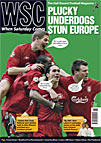 Phil Town on Jose Mourinho's short-lived TV debut
Phil Town on Jose Mourinho's short-lived TV debut
“I’m the face of Portugal in the world,” José Mourinho told the current affairs magazine Visão recently. While footballing heroes such as Eusébio, Luis Figo and Cristiano Ronaldo may still lay some claim to that distinction, it is hard from a global perspective to disagree with Mourinho’s assertion. London-based fashion designer Nuno Reis told Visão: “Suddenly, I’m not someone from a Third World country… I’m from the same country as José Mourinho.”
Mourinho’s popularity/notoriety has impacted greatly on the Portuguese at home, too. As Mourinho says, it has taken a move away from Portugal to get Benfiquistas and Sportinguistas to join Portistas in at least admiring him, if not necessarily liking him. And “Chel-say-ah” have taken over from Manchester United and Real Madrid as Portugal’s favourite foreign club, warranting full live TV coverage of all their games.
It must, then, have seemed perfect sense to independent channel SIC to make a programme around Mourinho. Indeed, a previous appearance by him on the same channel had won 300,000 extra viewers on the night, an immense number for Portuguese TV.
Mourinho was to be a monthly, hour-long conversation with the man, giving him free rein to comment on all aspects of the game, and SIC were banking on it to see off the opposition, more specifically arch rival TVI’s “rurality” show, Quinta das Celebridades (Celebrity Farm). They were to pay Mourinho £10,000 an edition, three times what the most popular commentator on TV, the former politician Marcelo Rebelo de Sousa, is getting with state channel RTP. But each commercial break would bring in, by one estimate, a cool £1 million.
Mourinho’s reasons for doing the programme were less clear. He hardly needed the money, after all: Visão estimated that with salary, plus advertising and sponsorship deals, he will soon be earning around £14,000 an hour. He has said that in 12 or 13 years, he wants to be the Portugal coach, so there may well have been a desire to keep himself in the Portuguese public eye. But after just one edition, on April 18, Mourinho was off the air. The agency in charge of Mourinho’s image, Gestifute, wasted no time in posting the reasons for the split on its website: Mourinho had “little time available to participate in the planning of the programme”; he understood “the limitations of not being able to travel to Lisbon” for it, with “the resulting loss of quality of communication”; and then there was “the abusive use of his words, adulterated and decontextualised by the world’s media”. A programme that had been aimed at the Portuguese market had attracted international attention and this had effectively turned it into a violation of Chelsea’s internal rules on media exposure, which Mourinho had himself helped to draft.
One of the main reasons for the swift withdrawal will surely have been, though, that Mourinho and his advisers feared the potential damage to his image had he continued. Slouched in front of the Sky studio’s “speaking from London” Houses of Parliament backdrop, the normally urbane Mourinho looked oddly uncomfortable throughout and was disappointingly uncontroversial. The master of the sound-bite sprint was frankly dull over the long distance, just a talking head, which, as it was stationary, drew even more attention than usual to the Supermarionated lower lip.
He talked of the Portuguese title race, of his UEFA ban, of his tactics in the League Cup final (“aided” by resolutely unhelpful graphics), and he touched on the Apito Dourado (Golden Whistle) referee bribery scandal, one of the more delicate moments. Porto had been accused of sweetening the match officials with prostitutes before a game last season; Mourinho seemed a little taken aback by the subject – odd given that he was supposed to have cleared the programme’s content beforehand: “I know what I did at FC Porto and I don’t want to think that it’s true. I don’t even remember the game.” Which was surprising considering the man’s normally photographic memory of his teams’ matches.
At the end of the programme, Mourinho was halfway through an exposition of Chelsea’s upcoming games when the satellite time ran out, cutting him off. A misfiring evening was capped by some bad news for SIC: Mourinho had lost the head-to-head with Celebrity Farm by some 250,000 viewers. It had altogether been a rather unhappy experiment.
From WSC 220 June 2005. What was happening this month